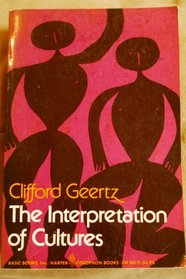Clifford Geertz: The Interpretation of Cultures: Selected Essays (1973–) [EN, PT, CZ, ES, RU]
Filed under book | Tags: · anthropology, culture, ethnology, ideology, politics

“In The Interpretation of Cultures, the most original anthropologist of his generation moved far beyond the traditional confines of his discipline to develop an important new concept of culture. This groundbreaking book, winner of the 1974 Sorokin Award of the American Sociological Association, helped define for an entire generation of anthropologists what their field is ultimately about.”
Publisher Basic Books, New York, 1973
ISBN 0465097197, 9780465097197
470 pages
via Sorin Danut
Wikipedia (EN)
The Interpretation of Cultures: Selected Essays (English, 1973/2000, updated on 2021-9-23)
A interpretação das culturas (Brazilian Portuguese, 1989/2008, via Rodrigo)
Interpretace kultur: Vybrané eseje (Czech, trans. Hana Červinková, Václav Hubinger and Hedvika Humlíčková, 2000)
La interpretación de las culturas (Spanish, trans. Alberto L. Bixio, 2003)
Интерпретация культур (Russian, trans. О.В. Барсукова, A.A. Борзунов, Г.М. Дашевский, Е.M. Лазарева and В.Г. Николаев, 2004)
Tobias Conradi, Heike Derwanz, Florian Muhle (eds.): Strukturentstehung durch Verflechtung: Akteur-Netzwerk-Theorie(n) und Automatismen (2011) [German]
Filed under book | Tags: · actor-network theory, culture, technology, theory

“Die Akteur-Netzwerk-Theorie stellt mit ihrem Anliegen, die Verflechtungen zwischen Natur, Kultur, Gesellschaft und Technik strikt empirisch zu erforschen, eine Herausforderung für die Sozial- und Kulturwissenschaften dar. Dieser Herausforderung widmet sich der Band aus einer interdisziplinären Perspektive. Ein Hauptinteresse gilt der Frage, wie mit der Akteur-Netzwerk-Theorie die Entstehung ungeplanter Strukturen untersucht werden kann.
Nach einem einleitenden Text von John Law wird eine kritische Diskussion über die überraschende Handlungsfähigkeit nicht-menschlicher Akteure, die Verteilung von Macht in Netzwerken sowie mögliche Akzentverschiebungen und theoretische Anschlüsse an die ANT entfaltet. Die Beiträge gehen dabei der Handlungsmächtigkeit von Viren, Problemen des Regierens nach Hurrikan Katrina oder der Frage einer nicht-modernen Geschichte moderner Medien nach.”
Publisher Wilhelm Fink, Munich, 2011
ISBN 3770552202, 9783770552207
341 pages
Theory, Culture & Society 29(4-5): Topologies of Culture (2012)
Filed under journal | Tags: · cultural theory, culture, database, mapping, media infrastructure, social theory, technology, topology

“In social and cultural theory, topology has been used to articulate changes in structures and spaces of power. In this introduction, we argue that culture itself is becoming topological. In particular, this ‘becoming topological’ can be identified in the significance of a new order of spatio-temporal continuity for forms of economic, political and cultural life today. This ordering emerges, sometimes without explicit coordination, in practices of sorting, naming, numbering, comparing, listing, and calculating. We show that the effect of these practices is both to introduce new continuities into a discontinuous world by establishing equivalences or similitudes, and to make and mark discontinuities through repeated contrasts. In this multiplication of relations, topological change is established as being constant, normal and immanent, rather than being an exceptional form, which is externally produced; that is, forms of economic, political and cultural life are identified and made legible in terms of their capacities for continuous change. Outlining the contributions to this Special Issue, the introduction discusses the meaning of topological culture and provides an analytic framework through which to understand its implications.” (from the Abstract)
With contributions by Celia Lury, Luciana Parisi, and Tiziana Terranova, Peter Sloterdijk, Rob Shields, Sandro Mezzadra and Brett Neilson, Penelope Harvey, Mike Michael and Marsha Rosengarten, Evelyn Ruppert, Steven D. Brown, Luciana Parisi, Richard Rogers, Xin Wei Sha, Brian Rotman, Scott Lash, Noortje Marres, Matthew Fuller and Andrew Goffey, Julian Henriques.
Publisher Sage
ISSN 0263-2764
342 pages
PDF (6 MB, updated on 2016-12-12)
Comment (1)
